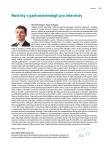Therapy for peptic ulcer disease
Authors:
Milan Lukáš 1,2
Authors‘ workplace:
Klinické a výzkumné centrum pro střevní záněty, ISCARE I. V. F., a. s., Praha
1; Ústav klinické biochemie 1. LF UK a VFN v Praze
2
Published in:
Vnitř Lék 2018; 64(6): 595-599
Category:
Reviews
Overview
The modern therapy for peptic ulcer disease and other acid peptic diseases is based on administration of proton pump inhibitors (PPI) which have fully replaced anacids, parasympatholytics and histamine H2 receptor antagonists. The most effective way is to administer proton pump inhibitors in the morning on an empty stomach in a single daily dose. It is a very safe therapy, despite the fact that a potential adverse effect of long-term PPI treatment on the efficacy of other medications (clopidogrel), on bone metabolism and development of respiratory infections have been discussed recently. PPI also play an essential role in the eradication treatment of Helicobacter pylori infection, the prevention and treatment of gastropathy induced by nonsteroidal anti-inflammatory drugs and in relation to some rare hypersecretory conditions. The role of proton pump inhibitors in the therapy for functional dyspepsia is contradictory. Massive bleeding from the peptic ulcer is a relatively frequent complication of NSAID gastropathy. Endoscopic hemostasis and parenteral administration of PPI for at least 72 hours are used in therapy.
Key words:
acid peptic diseases – gastric secretion – peptic ulcer – proton pump inhibitors
Sources
- Martínek J, Lukáš M. Inhibitory protonové pumpy: up to date. Gastroent Hepatol 2011; 65(6): 331–342.
- Špičák J. Inhibitory protonové pumpy: vedlejší účinky a interkace. Gastroent Hepatol 2013; 67(4): 289–297.
- Heribanová L. Extraezofageální a gastroezofageální reflux a vztah k astma bronchiale. Gastroent Hepatol 2016; 70(5): 438–442.
- Olbe L, Carllsson E, Lindberg P. A proton-pump inhibitor expedition: the case histories of omeprazole and esomeprazole. Nature reviews. Drug Discov 2003; 2(2): 132–139. Dostupné z DOI: <http://dx.doi.org/10.1038/nrd1010>.
- Miehlke S, Madisch A, Kirsch C et al, Intragastric acidity during treatment with esomeprazole 40 mg twice daily or pantoprazole 40 mg twice daily – a randomized, two-way crossover study. Aliment Pharmacol Ther 2005; 21(8): 963–967. Dostupné z DOI: <http://dx.doi.org/10.1111/j.1365–2036.2005.02432.x>.
- Bureš J et al (Pracovní skupina pro studium Helicobacter pylori při ČGS ČLS JEP). Infekce Helicobacter pylori. Doporučený postup České gastroenterologické společnosti ČLS JEP pro dospělé. [online]. Dostupné z WWW: <http://www.cgs-cls.cz/wp-content/uploads/2015/04/guidelines-infekce-helicobacter-pylori.pdf>.
- Pročke M. Současný pohled na eradikaci Helicobacter pylori. Lékařské listy 2010; 59(5): 5–7.
- Databáze registrovaných léčivých přípravků, SLP a PZLÚ. 2016 [online]. Dostupné z WWW: <http://www.sukl.cz/modules/medication/search.php>.
- Zimandlová D, Bureš J. Současné možnosti léčby peptických vředů. Interní Med 2012; 14(2): 51–54.
Labels
Diabetology Endocrinology Internal medicineArticle was published in
Internal Medicine

2018 Issue 6
-
All articles in this issue
- Current trends in the diagnosis and treatment of gastroesophageal reflux disease
- Therapy for peptic ulcer disease
- History of celiac disease
- Celiac disease in 2018
- Diagnosis of gastrointestinal motility disorders
- Diverticular disease: diagnosis and treatment
- Familial adenomatous polyposis: complex patient management
- Conventional and biological therapy for inflammatory bowel disease
- The IBD outpatient care in the clinical practice
- PSC-IBD: specific phenotype of inflammatory bowel disease associated with primary sclerosing cholangitis
- Possibilities of therapeutic manipulation of the gut microbiota
- Prokinetics and their use in gastroenterology
- Colorectal cancer screening
- Therapeutic digestive endoscopy I
- Therapeutic digestive endoscopy II
- Internal Medicine
- Journal archive
- Current issue
- Online only
- About the journal
Most read in this issue
- Prokinetics and their use in gastroenterology
- Diverticular disease: diagnosis and treatment
- Diagnosis of gastrointestinal motility disorders
- Current trends in the diagnosis and treatment of gastroesophageal reflux disease
